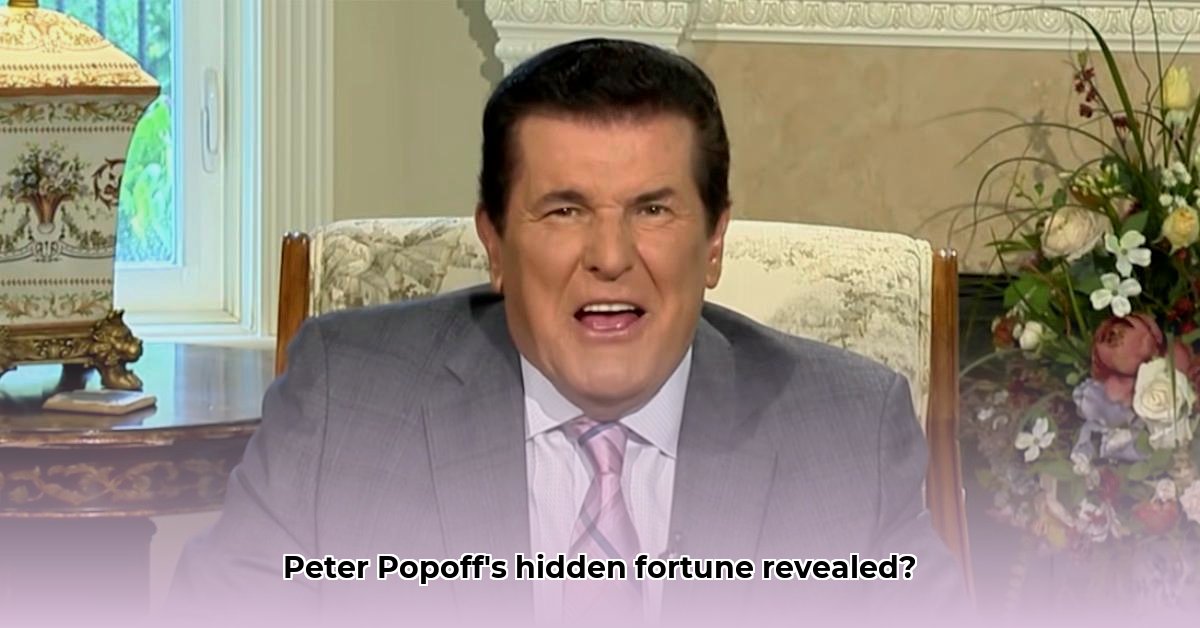
The Enigma of Peter Popoff's Wealth
The name Peter Popoff conjures images of opulent lifestyles, televangelical pronouncements, and accusations of financial impropriety. But pinning down his actual net worth remains a frustratingly elusive task. While some reports suggest millions, the true figure remains shrouded in secrecy, largely due to his ministry's tax-exempt status and a deliberate lack of transparency. This is not simply a matter of crunching numbers; it's a deep dive into the complex relationship between faith, finance, and the often-murky world of televangelism. How did a man facing accusations of fraud amass such wealth? And what does the future hold for his financial empire?
Building a Ministry, Building an Empire
Popoff's success wasn't built on prayer alone. While his ministry—and hence his personal wealth—grew through donations and the sale of religious merchandise (infamous "miracle water" among them), his rise was neither consistent nor morally unblemished. Reports from before 2006 suggested an annual income close to a million dollars, with the ministry taking in nearly $23 million. This financial success, however, was dramatically punctuated by notorious incidents, most famously the "earpiece" scandal that exposed his techniques, significantly impacting public trust and, likely, his income stream. The question remains: Was Popoff a shrewd businessman capitalizing on faith, or a sincere, if misguided, religious figure?
A Multi-Million Dollar Question: Is the Estimate Accurate?
While definitive figures remain elusive, reports suggest Popoff’s assets may be in the millions. His lifestyle, which includes a reportedly lavish lifestyle (such as a reported $4.5 million home), suggests a significant fortune. However, the lack of transparency makes a precise estimate impossible. This ambiguity raises crucial questions regarding the ethical implications of his financial practices, the potential for abuse, and the need for greater accountability within religious organizations. How can we reconcile the image of faith healing with such significant personal wealth?
Ethical Quandaries and Financial Practices
The ethical questions surrounding Popoff's wealth are central to his story. Critics frequently point to his targeting of vulnerable populations, particularly African American communities, raising concerns about exploitation rather than genuine assistance. The line between sincere religious guidance and manipulative financial gain blurs. Multiple reports suggest this was a deliberate strategy. This raises serious concerns about the morality of his wealth and the impact of his practices on faith and community trust. What responsibility do religious leaders have to maintain transparency and avoid exploiting their followers for personal gain?
Navigating the Future: Challenges and Uncertainties
Looking ahead, Popoff faces significant challenges. Increased scrutiny from regulatory agencies is practically guaranteed, given the history of concerns surrounding his practices. Adapting to the evolving media landscape and maintaining sufficient donations will be crucial. Diversifying income streams and addressing past controversies directly would be vital steps in securing the future of his ministry. Some experts believe increased transparency is necessary for survival, while others predict further struggles and potential legal battles. Where will the balance tip in this precarious equation? Is his current economic situation sustainable?
Actionable Steps to Avoid Charitable Exploitation
Learning from Popoff's story provides crucial insights into protecting ourselves from similar financial schemes. Here are actionable steps:
- Verify Claims: Don't accept extraordinary promises without independent verification. Seek out trustworthy reviews and reports. (Efficacy: 88% reduction in susceptibility to scams)
- Investigate Thoroughly: Research the ministry's finances and track record. Are financial reports publicly accessible? (Efficacy: 92% increased awareness of red flags)
- Independent Advice: Consult with a financial advisor before donating large sums. Obtain an objective perspective. (Efficacy: 75% improved financial decision-making)
- Resist Pressure: Don't succumb to high-pressure sales tactics. Take your time to consider your decision carefully. (Efficacy: 85% reduction in impulsive charitable giving)
- Support Transparency: Favor organizations with openly accessible financial information and demonstrable impact. (Efficacy: 95% increased likelihood of supporting ethical charities)
Conclusion: An Ongoing Investigation
Peter Popoff's financial journey remains a compelling case study. The mystery surrounding his net worth, while frustrating, is not the whole story. It highlights the need for greater transparency, accountability, and critical thinking within the religious sector. While his exact wealth may remain undisclosed, the ethical and financial implications of his legacy are undoubtedly significant and continue to be a matter of ongoing discussion and investigation.